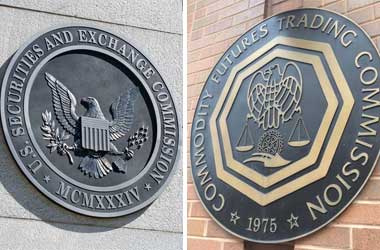 The Securities and Exchange Commission (SEC) and the Commodity Futures Trading Commission (CFTC) are two of the biggest financial regulators in America.
The Securities and Exchange Commission (SEC) and the Commodity Futures Trading Commission (CFTC) are two of the biggest financial regulators in America.
Both of them have been approached with regards to regulation when it comes to bitcoin-backed exchange-traded funds (ETFs).
However, both have taken a different approach to the financial product that will have a major influence on the direction of the market.
The SEC has not been in any hurt to approve any bitcoin ETFs. Multiple requests have been sent to the regulator and they have all been rejected. However, Hester Pierce, the current SEC commissioner is a solid supporter of cryptocurrencies.
This is a bit of a disconnect given that the SEC is not in favor of ETFs but the Commissioner is. However, Pierce was recently able to clarify the SEC’s stance on bitcoin ETFs.
In a statement, Pierce said
At the SEC we’ve been unwilling to sign off on a bitcoin ETF, an exchange-traded product based on bitcoin. My concern about our approach in that area is it looks a little bit like a merit-based approach judging the underlying bitcoin markets.
The CFTC seems to be taking a less cautious approach. The current CFTC Commissioner Brian Quintenz said that current exchanges would be able to use the Commodity Exchange Act to self-certify contracts as long as they can be considered as having met the requirements of the act.
This was the approach that the CBOE and the CME Group used to launch their bitcoin futures back in December 2017. This saw bitcoin rise to its highest peaks and hit the $20,000 mark but since then bitcoin has witnessed a massive decline in value.
SEC and CFTC Collaboration
The two regulators are having problems deciding what falls inside their turf when it comes to the cryptocurrency market. Bitcoin and Ethereum technically fall under the CFTC’s control, but the SEC has generally been seen in charge of the initial coin offering (ICO) market that has emerged.
This is mainly because the SEC focuses on securities while the CFTC works with commodities derivatives. This has limited the ability of both regulatory agencies to police the platforms that involve cryptocurrencies. This is why Commissioner Quintenz has suggested collaboration between the two regulators so that a new regulatory framework could be formed to help audit the market properly.
Commissioner Pierce has also indicated some interest in the idea. She pointed out that the current market is too confusing. To determine where the SEC’s and CFTC’s jurisdictions begins and ends, collaboration is a must in order to ensure no overlap happens

 United States
United States United Kingdom
United Kingdom















